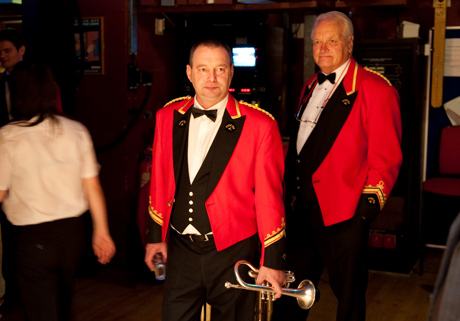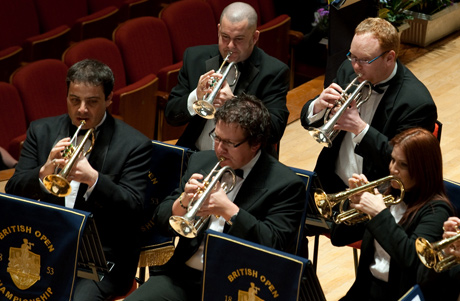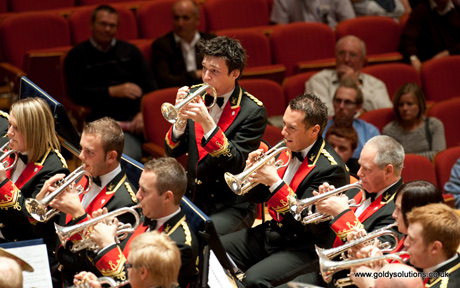2009 British Open Championships - Soprano tests, trials and tribulations
15-Sep-2009There were plenty of questions asked of soprano players on the weekend - so did the current crop come up to the Titan mark?

Ready to put a reputation on the line: Alan Wycherley waits in the wings
Picture: Ian Clowes
For more pictures of the 2009 British Open:
http://www.pbase.com/troonly/090911_birmingham_open
One of the more intriguing sub plots of the contest day at Symphony Hall was the expectation the audience had of the 18 soprano players on show.
Alan Wycherley of Foden’s, one of the most experienced high wire exponents in the banding world, had opened up a debate about the very future of soprano playing on 4BR just a couple of days before the contest.
Come a cropper?
Was this piece as technically fearsome, as he had indicated? Could the elder statesman himself still stand up and produce the goods against the young tyros who now sit looking like cherub faced assassins in the sop chairs of many of our top bands? Would any of them come a cropper?
Well, yes and no.
’Titan’s Progress’ did indeed contain soprano cornet writing of the X rated variety – although not all of it was as gruesomely high pitched as a scream from a disembowelled virgin in a horror film.
Ice pick
There was a few moments when the hearing aids of the more elderly in the audience (and not in the box before you think we are going down the Steven Mead road) would have caused the type of earache Trotsky felt when he came into contact with an ice pick, but even a high top E and Eb and a sprinkling of top D’s held no terrors on the day.
If there were struggles, they were to be found in the more lyrical, and dare one say, traditional soprano cornet writing that was so deliciously realised by composer Hermann Pallhuber in the score.

The winning man: Richard Evans makes his mark from number 1
Picture: Ian Clowes
Strange animals
Soprano players are strange animals at the best of times – their mood governed more by the cycles of the moon than anything else. Madness isn’t a prerequisite to soprano playing excellence, but it does tend to help if there is a little bit of dislocation from reality – and that included the two female sop players too.
The challenge of the near impossible attracts the darker parts of their nature – the fear of failure cannot exist in their hearts. If it did, not one of them would have survived the day.
However, the pianissimo writing, marked ‘tender’ first found at rehearsal letter G (and the five or so bars before that caused no end of problems with trying to find the right articulation on a mid range introductory motif) was what sorted the best from the rest.
Bygone era
This was soprano playing from a bygone era – sweet, tuneful and expressive – all at a dynamic that demanded an appreciation not just of the individual line, but that of others around you.
Some played safe and came in at a volume greater than that of the preceding solo cornet (marked piano), whilst others (the ones with pulse rates of the undead) just relished the opportunity to showcase their ability to control the flow of air through the instrument without sounding like the death rattle of a strangled cat.
When it came off the effect had a touch of magic about it – and more than a handful of players did just that (including one A. Wycherley Esq). Those who didn’t will know that perhaps they either had a bit of a bad day at the office, or they should start considering playing a different instrument.

The future? Paul Duffy leads the next generation of sop players with Black Dyke
Picture: Ian Clowes
The future?
For if this is the future of soprano cornet writing then let’s have more of it.
The blasters had plenty to get their teeth into (including the rim of the mouthpiece in some cases), whilst those of a more lyrically inspired disposition will also have known there was more than enough in the piece to satisfy their cravings too.
It gave the adjudicators a hard task of picking a winner of the Brian Evans Memorial Trophy (and he would have surely relished this piece).
Olympian
In the end they picked Richard Evans from Desford, the man who started the ball rolling at 10.00am in the morning off the number 1 draw (and given that he was enjoying a quiet beer at way past the midnight hour in the hotel in Friday night, it goes to show just what a lunar inspired Olympian constitution he has). His bravura performance was a worthy one in every respect.
The 2009 British Open gave us a glimpse of what the future of brass band soprano playing at the highest level will possibly sound like in the years to come – and a glimpse of many of the thrill seeking practitioners of the instrument who will be providing it.
If it is as good as we heard on the weekend, then it will be something to look forward too.
Iwan Fox















